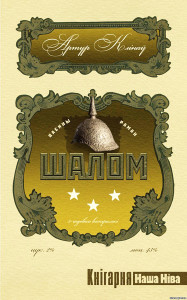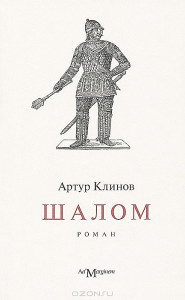
A cover of the book. Minsk, Logvinau publishing house 2011
“Shalom”(Note: “A Helmet”) is a novel that in European literature genre was once called “adventurous”. However, Klinau’s protagonist’s adventures originate not so much from his character but rather from the phantasmagoric situation in which he founds himself. Once having put on a copper Kaiser helmet, the hero of the novel did not want to take it off and went from Germany via Poland to Belarus wearing the helmet. Naturally, due to this specific feature, he has had many reasoned conflicts and various adventures that form the plot of the novel…”
Valancin Akudovič , a philosopher
“It is hard to find a work in contemporary Belarusian literature that is so clearly and consistently as “Shalom” raised the issues of national identity, search of country’s own place in Europe, and perception of the Belarusians by other European nations. It is difficult to find in the Belarusian literature a text more suitable and “open” to research space-describing techniques, literary topography of European cities, artistic reflection of the opposition “East-West”, and other manifestations of modern geopolitics.
It should be acknowledged that the idea toputona Kaiser helmet of the World War I and send it to Belarus of Lukashenko is extremely productive in terms of creation of numerous subject collisions and testing a variety of ideologies and stereotypes. A strange act of the hero raises many questions. The author explains it differently depending on the situation and creates a wide field for readers’ interpretations. The word “Śalom” in the Belarusian language means a vintage military helmet, but at the same time in Jewish it is understood as “Let peace be with you”. Thus, the helmet on Andre’s head is a declaration of war and also a sign of peace; it is a challenge of a “superman” to the useless world, and also the recognition of total surrender to the world. It is a brilliant, most significant art project of the hero and at the same time a final rejection of art projects; it is a well- thought ideological sabotage and at the same time the usual madness: in the end, helmet is absurd, it is a doubled dismay, cubed meaninglessness.
The opposition “East-West” is clearly seen throughout Artur Klinau’s novel and presented not only in a joking manner. A striking example of reflection of postmodern geopolitics are descriptions of cities and countries which Andre visits. The protagonist’s mind undergoes a psychological and aesthetic acquisition of the medium-European space, the transformation of the geopolitical realities in cultural phantoms. Another manifestation of the opposition “East-West” in Klinau’s novel is a confrontation between European and Russian philosophy and culture: Hoffmann and Turgenev, Dostoevsky and Kant, Marx and Berdyaev. Both the hero of the novel and its author seem to fully share a well-known thesis of Ignatius Abdziralovich about the specifics of Belarus as a cultural space in between: between East and West, between the Latin and Byzantine civilization, between Catholicism and Orthodoxy.
Siarhiel Kavalou. “Shalom”: MASTERING THE EUROPEAN SPACE. «Porównania». Poznań, 2013

A cover of the book. Moscow, AdMarginum 2013
The publishers called novel “Shalom” written by Minsk artist and writer Artur Klinau a Belarusian “Moscow-Petushki” by Venedict Yerofeyev. It is a great marketing tactic. It is of course speculative like all marketing tactics are. “Shalom”, which tells about the adventures of a contemporary artist, is, of course, a hilarious book. Almost as funny as “Moscow-Petushki” if that is what the publishers meant. Though, Yerofeyev’s sense of humor is radically different from that of Klinau’s.
“Shalom” is a travel novel, just like “Moscow-Petushki”. The difference is that by the end of Yerofeyev’s main hero’s “last journey” from Moscow to Petushki the reader learns absolutely everything about him. It is, in fact, a journey of the soul which unfolds according to the laws of a classical tragedy: exposition, development, climax, denouement, and ending. Klinau’s protagonist Andre is, on the contrary, trying to turn his life into an actual artistic statement. In other words, he doesn’t want to be like everyone else.
Readers don’t follow nuances of the emotional experiences of the hero; they follow how he manages to convince others that he is right. “Śalom” is a series of situations which manifest different attitudes to one and the same deed of the hero. The main difference between “Śalom” and “Petushki” is not that much formal or meaningful, it is – dare I say it – ideological.
Yerofeyev’s hero is a classical “Little Man” of the great Russian literature, a kind of Akakiy Akakiyevich Bashmachkin from Gogol’s story “Overcoat”. He only lives in the second half of the 20ies century, and instead of wearing an overcoat he wears vodka. Klinau’s hero is a man who has tasted fashionable ideas of Western tolerance. He deliberately wants to appear different, even absurdly, maniacally different. But if in Germany or Poland his otherness is perceived as something that is taken for granted, in Belarus … It can’t be accustomed to in the native swamp whatever you do!
After reaching his Petushki Venichka “has never regained consciousness”. Meanwhile, Andre in Minsk does not surrender, he voices his persecutors the sacramental four letters, but doesn’t agree to be like everyone else. And this is pleasing.
Igor Zotov “Minsk will never become Petushki”, www.kultpro.ru